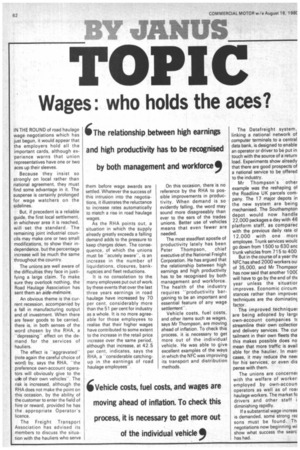TO PI
Page 64

If you've noticed an error in this article please click here to report it so we can fix it.
Wages: who holds the aces?
IN THE ROUND of road haulage wage negotiations which has just begun, it would appear that the employers hold all the important cards, although experience warns that union representatives have one or two aces up their sleeves.
Because they insist so strongly on local rather than national agreement, they must find some advantage in it. The suspense is certainly prolonged for wage watchers on the sidelines, But, if precedent is a reliable guide, the first local settlement, in whichever area it is reached, will set the standard. The remaining joint industrial councils may make one or two small modifications, to show their independence, but the percentage increase will be much the same throughout the country.
The unions are well aware of the difficulties they face in justifying a large claim. To make sure they overlook nothing, the Road Haulage Association has sent them an aide-mdmoire.
An obvious theme is the current recession, accompanied by a fall in manufacturing output and of investment. When there are fewer goods to be carried, there is, in both senses of the word chosen by the RNA, a -depressing" effect on the demand for the services of hauliers.
The effect is -aggravated" (note again the careful choice of word) by, says the RHA, "the preference own-account operators will obviously give to the
of their own vehicles". The risk is increased, although the RHA does not make the point on this occasion, by the ability of the customer to enter the field of hire or reward, provided he has the appropriate Operator's licence.
The Freight Transport Association has advised its members to discuss the situation with the hauliers who serve them before wage awards are settled. Whatever the success of this intrusion into the negotiations, it illustrates the reluctance to increase rates automatically to match a rise in road haulage wages.
As the RHA points out, a situation in which the supply already greatly exceeds a falling demand adds to the pressure to keep charges down. The consequence, of which the unions must be -acutely aware-, is an increase in the number of liquidations, closures, bankruptcies and fleet reductions.
It is no consolation to the many employees put out of work. by these events that over the last three years earnings in road haulage have increased by 70 per cent, considerably more than the 51 per cent for industry as a whole. It is no more agreeable for those employees to .realise that their higher wages have contributed to some extent to the increase in the retail price increase over the same period, although that increase, at 42.5 per cent, indicates, says the RHA, a "considerable catchingup in the earnings of road haulage employees-.
On this occasion, there is no reference by the RHA to possible improvements in productivity. When demand is so evidently falling, the word may sound more disagreeably than ever to the ears of the trades unions. Better use of vehicles means that even fewer are needed.
The most steadfast apostle of productivity lately has been Peter Thompson, chief executive of the National Freight Corporation. He has argued that the relationship between high earnings and high productivity has to be recognised by both management and workforce. The health of the industry requires "productivity bargaining to be an important and essential feature of any wage settlement' ' .
Vehicle costs, fuel costs, and other items such as wages, says Mr Thompson, are moving ahead of inflation. To check this process, it is necessary to get more out of the individual vehicle. He was able to give excellent examples of the ways in which the NFC was improving its transport and distribution methods.
The Datafreight system, linking a national network of computer terminals to a central data bank, is designed to.enable an operator or driver to be put in touch with the source of a return load. Experiments show already that there are good prospects of a national service to be offered to the industry.
Mr Thompson's other example was the reshaping of the Roadline UK parcels company. The 17 major depots in the new system are being mechanised. The Southampton depot would now handle 22,000 packages a day with 46 platform staff, as compared with the previous daily rate ol 12,000 with one more employee. Trunk services woulc go down from 1500 to 630 anc trunk vehicles from 715 to 400
But in the course of a year the NFC has shed 2000 workers ou. of 35,000, and Mr Thompsor has now said that another 100C will have to go by the end of thE year unless the situatior improves. Economic circum stances rather than improve( techniques are the dominatinc. factor.
The improved technique are being adopted by largE own-account companies t( streamline their own collectior and delivery services. The cur tailment in their own fleets tha this makes possible does no mean that more traffic is avail able for the haulier. In mans cases, it may reduce the nee( for his services, or even dis pense with them.
The unions are concerne( with the welfare of worker: employed by own-accoun operators as well as of roai haulage workers. The market to drivers and other staff i diminishing rapidly.
If a substantial wage increas is demanded, some strong rez sons must be found. Th negotiations now beginning wi show what success the searc has had.












































































































